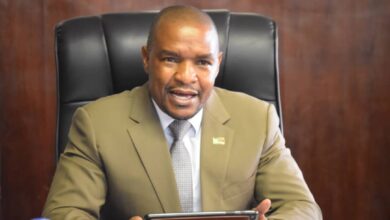TPF Issues Statement on Zimbabwe’s Launch of ZiG Currency
Date:11 April 2024
ZimTimes Staff
Admire Dube, the head of information for the Patriotic Front political party, commented on Zimbabwe’s introduction of the ZiG currency by emphasizing its significance. He highlighted that the currency transition represents a crucial step towards stabilizing the economy. Dube stressed the importance of implementing robust economic reforms, ensuring good governance, and adhering to market fundamentals to maintain the strength and resilience of the ZiG currency against external shocks. Additionally, he underscored the need for transparency and accountability in governance, along with measures to combat corruption and promote financial literacy among citizens. Dube also emphasized the role of the Patriotic Front in addressing economic challenges and expressed confidence in their approach to tackle the issue of currency and rebuild confidence in the nation’s financial system.
For the umpteenth time, Zimbabwe has ditched its existing currency in favor of a new one. The Patriotic Front expresses concerns that even this new currency, Zimbabwe Gold (ZiG), despite being pegged to the international value of gold bullion, may still face devaluation similar to its predecessors due to various systemic issues.
In addition to policy inconsistency, corruption, and lack of sound economic policies, other factors such as economic mismanagement, excessive money printing leading to inflation, weak infrastructure, and reliance on imports could contribute to ZiG’s depreciation. To maintain the strength of ZiG, Zimbabwe must implement robust economic reforms and adhere to fiscal discipline. This includes transparent and accountable governance, implementing effective monetary policies to control inflation, investing in infrastructure and human capital development, fostering a conducive business environment to attract foreign investment, diversifying the economy beyond gold, and promoting exports to earn foreign currency. Additionally, maintaining a stable political environment free from corruption and ensuring the rule of law are crucial.
Zimbabwe also needs to explore other measures to enhance confidence in ZiG, such as establishing independent institutions to oversee monetary policy, implementing strict regulations to combat corruption, promoting financial literacy among citizens, and engaging in international partnerships to support economic stability.
Ultimately, a combination of prudent economic management, good governance, and adherence to market fundamentals is essential for the ZiG to remain strong and resilient against external shocks. As the TPF, we still believe that our approach is the best in dealing with our economic woes. TPF believes that.
A nation’s currency is the aorta and lubricant that oils the wheels of the economy. It is inherently the source of local and investor confidence and the driver of production and trade. The substance of production, positive balance, progressive fiscus, and industrial growth are all a function of a good currency. Without a strong currency, there is clearly no incentive to produce. Essentially, investors commit their resources because their end goal is the bottom line – monetary returns.
This has been the missing element in our struggle. We cannot fix our economy and our country without having dealt with the issue of currency; therefore, TPF will prioritize the national currency and find a permanent solution.
We will commence with adopting a multi-currency regime and using the Rand (ZAR) as a currency of reference without necessarily adopting a Rand Union Regime. No one can doubt that the Rand has successfully been used in parts of Matebeleland with inflows derived from remittances from South Africa. This will enable us to begin to build the much-needed reserves, restore public confidence, and minimize current currency volatility and inflation.
The TPF government will swiftly eradicate unregulated black market currency trade through both an act of law by ene currently involved in the trade to set up regulated micro-finance institutions that will comply suring that all foreign currency traders are licensed and also by assisting thoswith national policy and FICAA law. We will not further exacerbate the impoverishment of our people by closing the sources of income, but it is profoundly important that business is conducted within the realms of law.
We have a clear plan for the introduction of a Zimbabwean currency that would be backed by a multi-mineral reserve regime. These minerals shall include but are not limited to gold, diamonds, platinum, silver, nickel, coal, chromite, etc. We will use the first two years of a multi-currency regime to rebuild our depleted and squandered reserves. The value of our currency against other currencies will be determined effectively by the amount of our mineral reserves. In this regard, we will use the first two years of our power in government to operationalize our Public-Private-Partnership (PPP) plan and invest heavily in mining infrastructure and mining operations in order to produce enough for export and reserves. In the course of building our reserves, we will innovatively track the value of our currency against other currency regimes through cross-pricing without necessarily transacting with the currency.
Apart from being a tool to track our mineral reserves and a mechanism that guides us towards the introduction of a new currency, it will also be a process that reinforces our commitment to building a transparent and efficient government.
Reforming the Reserve Bank of Zimbabwe At present, there is clearly a lack of economic leadership on the part of the central bank, and this is to a larger extent responsible for the prevailing financial quagmire. This, therefore, calls for the restructuring of the Reserve Bank in order to bring about policy stability, uproot corruption, and ensure that it effectively carries out its fundamental function of retaining and sustaining fiscal sanity in our economy.
We, as TPF, will not hesitate to undertake an ownership restructuring process of the RBZ that will see the government retaining 30% of the stake while the remaining 70% would be offered to the private sector. (Refer to our PPP framework below). We would, however, ensure that the redistribution of shares does not lead to the absolute takeover by a single conglomerate and that the ownership of the Bank is not recklessly transferred to a foreign entity. It is ours and for us to control and manage.
This process will give Zimbabweans an opportunity to invest, contribute to financial decision-making, and indeed bring about the much-needed capital injection into the Central Bank and the economy. The government stake would provide the much-needed checks and balances and be the source of revenue inflows to finance public services.









